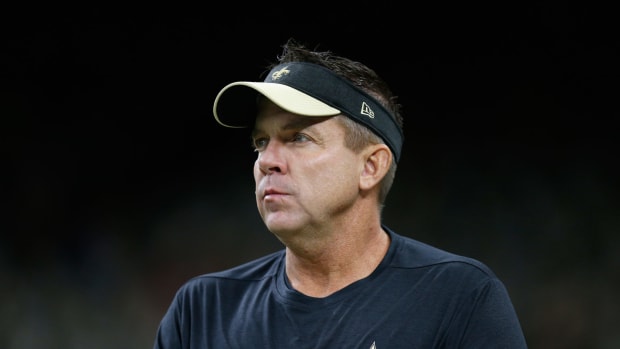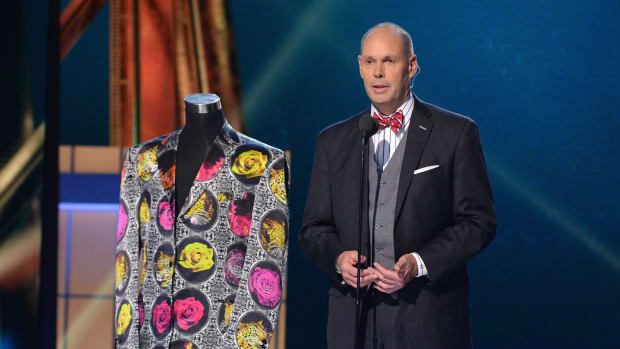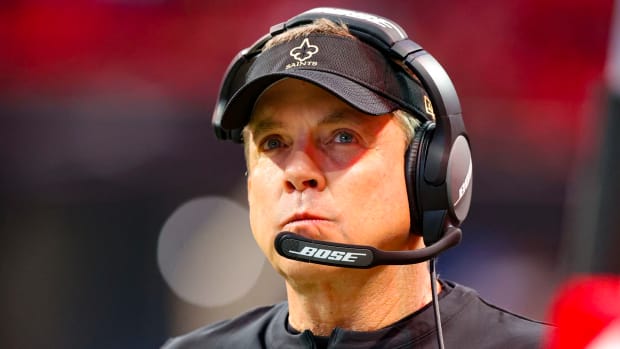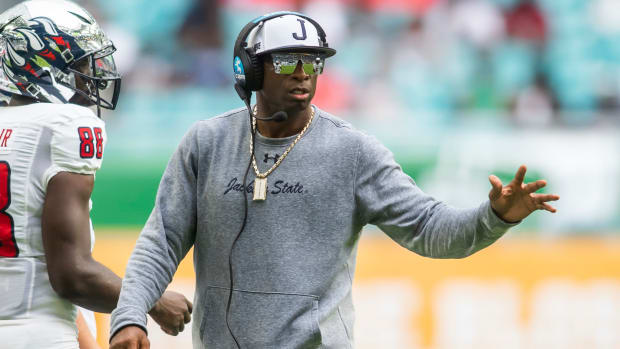Q&A With Thomas Q. Jones: NFL Career, Acting, 'Life After' On Prime Video, CTE
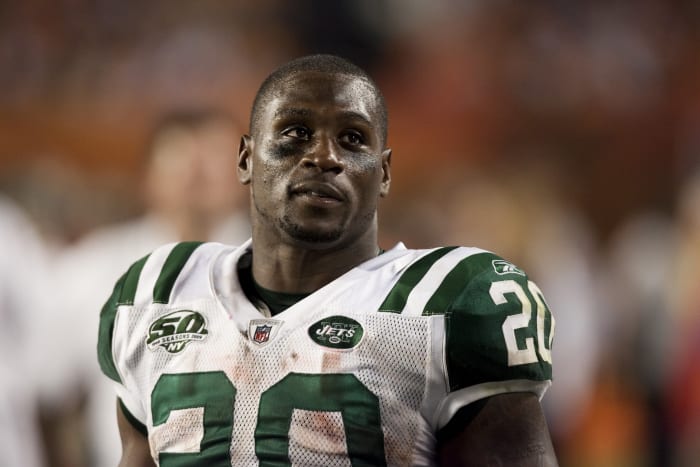
MIAMI - OCTOBER 12: Thomas Jones #20 of the New York Jets during an NFL game against the Miami Dolphins at Land Shark Stadium on October 12, 2009 in Miami, Florida. The Dolphins defeated the Jets 31-27. (Photo by Michael DeHoog/Sports Imagery/Getty Images)
Not many professional athletes have made the successful transition from playing sports to acting on the big screen, but former Pro Bowl running back Thomas Jones - who now goes by Thomas Q. Jones as his stage name - has found incredible success in both.
An All-American running back at Virginia, Jones went No. 7 overall to the Arizona Cardinals in the 2000 NFL Draft. But success in the NFL was hard to come by until he joined the Chicago Bears in 2004. In three years with the Bears, Jones rushed for over 3,400 yards and 22 touchdowns, and was the feature back in Chicago’s 2006 Super Bowl team.
Jones joined the New York Jets in 2007, where he really established himself as one of the elite backs. In 2008, he made his first Pro Bowl while leading the AFC in rushing yards. The following year, he set the Jets’ franchise record for rushing touchdowns as they went to their first AFC Championship Game in over a decade.
By the time he finished his career with the Kansas City Chiefs, Jones had rushed for 10,591 yards, making him one of only 31 players in NFL history to go for over 10,000 yards on the ground.
After retiring, Jones went into acting and committed himself fully to the new career. He was soon rewarded for his hard work with noteworthy roles in the hit film Straight Outta Compton, as well as a co-starring role in Netflix’s Marvel series Luke Cage.
Now Jones is working as a producer as well as an actor, with his most ambitious project thus far coming in the form of Amazon Prime Video’s Life After. We caught up with Jones to discuss his new project, his NFL career, the transition from football to acting and more.
This interview is made possible by NEO Studios:
The Spun: You are the new producer of Life After and have been getting some pretty notable acting roles since you retired. What made you want to join this project?
Thomas Q. Jones: It was very close to home to me, being a former NFL player. It’s an 8-part docuseries that follows the lives of 12 NFL players and some of the struggles that they have transitioning. I’m one of the producers and there are several other incredible producers working on this project as well. Being a former NFL player, having some struggles of my own to try to figure out the next chapter of my life, this was something I felt very important not just for the players to feel that they had a voice, but for the NFL fans so they could get an opportunity to see that once we retire, everything is not as pleasant as it may seem.
The Spun: What’s the most challenging part of producing Life After?
TQJ: The most challenging part was probably a lot of the travel. For our production team we put together an incredible group of players - very diverse players in regards to their careers and what they transitioned to. We went to Central Africa to interview Myron Rolle, and they we went out on the ocean for one other player who transitioned into fishing. It’s a wide variety of player, so it’s been challenging getting to all of the different locations.
Those challenges paid off. When you see the docuseries, when you see all of the different landscapes you’ll see that it definitely pays off.
The Spun: What’s been the most fun part of producing Life After?
TQJ: The most fun part for me was being connected again to all of the NFL players. Once I retired in 2012 and I left that locker room, you leave that world that you’re comfortable with and you leave that brotherhood that you’re used to. The NFL is a very unique experience with a very unique brotherhood of NFL players - present and former players - because it’s the same experience. Just to be able to talk to these guys that I played with or against, it felt good to be able to reconnect with them and to bond in a positive way.
The Spun: What would be your message to anyone on the fence about watching Life After?
TQJ: I would say this is a docuseries about vulnerable human beings that decided to play football. It’s more of a lifestyle piece where if you’re an NFL fan you can see your favorite NFL players and see behind the scenes the struggle or the brilliance at the same time of that player. Whether they were struggling to find something new, or whether they had something in mind and they were trying to do post-NFL.
This series appeals to everyone, whether you’re a football fan or just a fan of good, honest television.
The Spun: You’re probably the only 10,000-yard rusher in history to also play a Marvel villain. Are there any accomplishments in your NFL and acting career that you’re especially proud of?
TQJ: I guess individually, as a running back, definitely rushing for over 10,000 yards is it for me. It’s very hard to do. It’s not just physical challenge but it was an emotional and psychological challenge because there’s always something keeping from getting to that number, whether it’s an injury or you just ran out of gas or ambition to get there. To be able to rush for over 10,000 yards and be included in that club is probably the single most individual accomplishment that I’m proud of.
As an actor, definitely being a part of the Marvel Universe is huge. I grew up reading the comic books and I never thought as a kid I would be cast to play Comanche from the Luke Cage comic book. And now I’ve portrayed that character.
So both of those accomplishments are equal in regards to acting and football.
The Spun: Were there any players that you dreaded facing in the open field?
TQJ: One player that I… wouldn’t say dreaded playing, but knew every day that he was going to bring it every week was Junior Seau. He was the one player that never played within the defense. No matter how hard you practiced and schemed for him all week, you never knew where he was gonna end up. He was the wildcard because he was free to do whatever he wanted to do. He was the one player where I was like “Okay, I know he’s gonna make plays. So when I get the opportunity I’ve got to.”
The Spun: Back to filmmaking, what would you say was the biggest hurdle you’ve overcome so far?
TQJ: I would say the biggest hurdle is overcoming the idea that I’m a football player trying to act. And now I’m respected an actor who played football, which is hard to do because when you play 12 years in the NFL and rush for over 10,000 yards, you played in major markets like Chicago and New York, it’s hard for people to see you as anything else other than a football player.
So when I started acting I said, “How do I earn the respect of people that are watching me on screen?” The first thing I did was to add the middle initial to my stage name, to separate Thomas Jones the football player from Thomas Q. Jones the actor.
And so a lot of people didn’t know that Thomas Q. Jones was the same guy who played for the Jets and the Bears, and before they could have any preconceived notions of me, or see me act, they saw my character and they realized afterwards, “Hey, that’s Thomas Jones from the Jets!” So they saw me as an actor first, then a football player. I had to flip the script a little bit so to speak. But I’m very proud of that because even NFL fans respect me as an actor, which was the biggest challenge.
The Spun: Did you get acting coaching?
TQJ: I did. Retired in 2012 and when I decided to pursue acting seriously I enrolled in an acting studio. That’s when I really became an actor. I took classes for four years…
I really just committed to the business and treated it like I was just any other aspiring artist and I didn’t think about football or having a brand. If anything I wanted to erase that brand so I could get my start as an actor. The acting classes definitely helped me reach that peak performance as an actor.
The Spun: I have to imagine you trained pretty hard to get into shape for A Violent Man and Luke Cage. Did you have to do a new kind of training for those projects, or were you already as fit as they needed you?
TQJ: I actually had to switch up a lot of things. As an NFL player I would train to be as big and as fast as I possibly could before training camp. Usually the team has a designated weight, but I didn’t because I had very little body fat… But as an actor a lot of times you’re typecast when you’re that big, so I became pescatarian in 2016 so I could lose some of that mass. I also stopped lifting heavy weights so I could look lighter and as lean as I possibly could.
A lot of times I would go in for roles and they would like my auditions but they would say “He’s too big to play a doctor” or “He’s too big to play a lawyer.” One time I had a casting director ask me if I could lose some weight in my arms and I had never heard that before. So I had to stop doing biceps and triceps and get on the treadmill.
So I had to drastically change up my body to slim down, and even though I’m a bigger guy I’m not as big as I was. And it helped for me to be able to avoid getting typecast because people could stop saying “He’s too big for the role.”
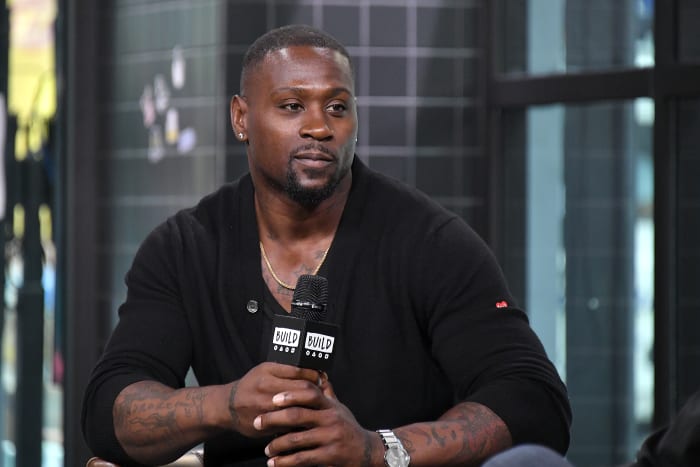
NEW YORK, NY - JULY 11: Actor Thomas Q. Jones visits Build to discuss the new season of "Luke Cage" at Build Studio on July 11, 2018 in New York City. (Photo by Michael Loccisano/Getty Images)
The Spun: You did say a few years back that you plan on donating your brain to study trauma and that you wouldn’t play football if you could do it over again. Do you still feel this way?
TQJ: I think with what I know now and what we’ve learned over the years with football and concussions, it’s probably safer to not play. Initially I would say no.
But then again, that experience changed my life forever. Football molded me into the man I am today. All of the hard work, discipline and dedication that it took for me to be successful in football, those traits are transferable now into acting, into producing and everything else that I’m doing. If I hadn’t played at that level, and had to put all of that to the test, I don’t know if I’d have a successful acting career. It’s a two-fold answer.
Initially I wouldn’t because I have injuries. I have knee, hip injuries. But I’m a warrior and I’m conditioned to keep moving, keep pushing forward.
So initially, no I wouldn’t play, and I’m still planning on donating my brain to the Sports Legacy Institute in Boston… I started doing some research into concussions after I retired. Unfortunately, I had a couple of friends who passed away from CTE - they had CTE which caused them to take their lives - and I feel like anything I can do to help guys who played in the NFL and put their lives on the line for entertainment… anything I can do to figure out a better way to make it safer for them, that’s the least I could do.
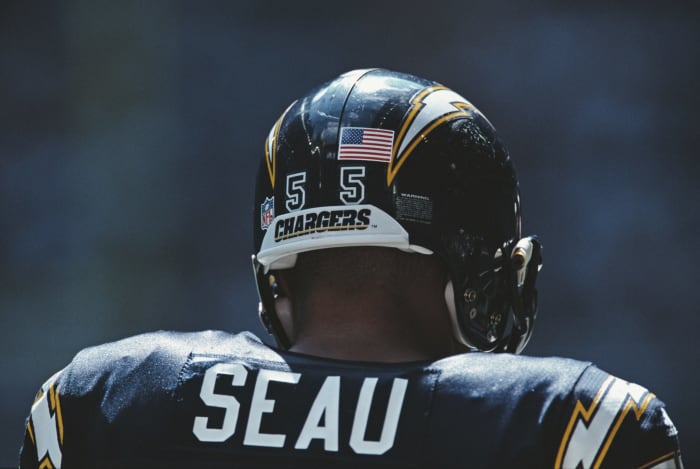
Junior Seau #8, Linebacker for the San Diego Chargers has a stars and stripes sticker placed on his helmet following the terrorist attacks on New York during the National Football Conference East game against the Dallas Cowboys on 23 September 2001 at theTexas Stadium, Irving, Texas, United States. The Chargers won the game 32 - 21. (Photo by Ronald Martinez/Getty Images)
The Spun: Do you still watch the NFL?
TQJ: I don’t really watch the NFL that much to be honest. I see more NFL clips and highlights on Twitter than I do on TV. Partly because I spend more focus on my acting and producing career. If the game’s on I’m usually on a call with one of my producers… But I definitely still keep up on social media. Bears fans, Jets fans, Chiefs fans, Buccaneers fans, Cardinals fans - they’re all so dedicated. So I still keep up with the fans and engage with them. But that’s about the only way I stay close to the game.
The Spun: What’s your final message to athletes or anyone in general looking to get into professional acting?
TQJ: I would say you can’t cheat this business. Either you put the work in and continue to evolve and get better and look for that opportunity to be successful, or you dabble and you don’t make any progress. It’s a very, very competitive business. Very hard. But with that being said, it’s been very fulfilling. I’ve met so many people, learned so much about myself, opened up my mind and seen things from so many perspectives and playing different characters that make me tap into these different idea.
So I would say, to anybody that wants to get into the business: Commit to it. You have to commit. If you don’t commit then you’re just wasting your time.
**

